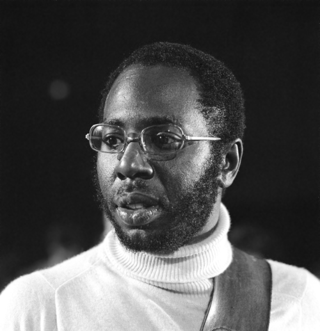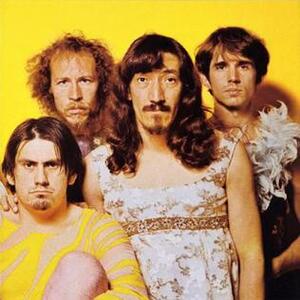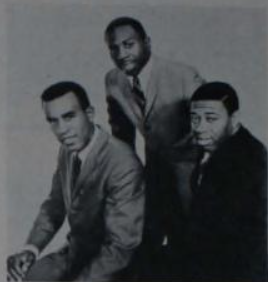We're a Winner may refer to:
- We're a Winner (song), a 1967 single by The Impressions
- We're a Winner (album), a 1968 album by The Impressions
We're a Winner may refer to:

Curtis Lee Mayfield was an American singer-songwriter, guitarist, and record producer, and one of the most influential musicians behind soul and politically conscious African-American music. Dubbed the "Gentle Genius", he first achieved success and recognition with the Rock and Roll Hall of Fame-inducted group the Impressions during the civil rights movement of the late 1950s and the 1960s, and later worked as a solo artist.

We're Only in It for the Money is the third album by American rock band the Mothers of Invention, released on March 4, 1968, by Verve Records. As with the band's first two efforts, it is a concept album, and satirizes left- and right-wing politics, particularly the hippie subculture, as well as the Beatles' album Sgt. Pepper's Lonely Hearts Club Band. It was conceived as part of a project called No Commercial Potential, which produced three other albums: Lumpy Gravy, Cruising with Ruben & the Jets, and Uncle Meat.

Daniel John Bedingfield is a New Zealand-British singer, songwriter, record producer and actor. His debut studio album, Gotta Get thru This (2002), spawned three UK number ones, "Gotta Get thru This", "If You're Not the One" and "Never Gonna Leave Your Side", and sold 1.6 million copies in that country. His second album, Second First Impression, was released in 2004. Bedingfield was a judge on The X Factor New Zealand in 2013. He has written songs for other artists and has acted in the West End theatre in London, UK.

Benjamin Michael Lee is an Australian musician and actor. Lee began his career as a musician at the age of 14 with the Sydney band Noise Addict, but he focused on his solo career when the band broke up in 1995. He appeared as the protagonist in the Australian film The Rage in Placid Lake (2003). He has released eleven solo studio albums.

The Impressions were an American music group originally formed in 1958. Their repertoire includes gospel, R&B, doo-wop, and soul.

"We're Going to Be Friends" is a song by American alternative rock band White Stripes from their album White Blood Cells. It was released in 2002 and tells the story of meeting a new friend at the beginning of a school year.
An impression is the overall effect of something.

"We're a Winner" is a 1967 single recorded by The Impressions for the ABC-Paramount label. Written and produced by Impressions lead singer Curtis Mayfield, the song is notable as one of the most prominent popular recordings dealing with the subject of black pride. The phrase "We're a Winner" was later used as the motto of Mayfield's record label Curtom Records.

Curtis/Live! is Curtis Mayfield’s first live album, after leaving The Impressions. Originally released in May 1971 as a double LP on Mayfield's Curtom label, the album's 16 tracks — along with Mayfield's interstitial raps on the politics of the day — were recorded at Paul Colby's 230 seater Bitter End nightclub in New York City. According to John Abbey, who at the beginning of the 1970s was editor of the UK magazine Blues & Soul, Mayfield and his band's first set at a Bitter End date in January 1971 comprised the bulk of the music presented here. Mixed primarily with Eddie Kramer at Electric Lady Studios, the album features Master Henry Gibson playing percussion, Craig McMullen on rhythm guitar, Joseph "Lucky" Scott on bass, and Tyrone McCullen on drums.

The Anthology 1961-1977 is a compilation album of songs by Curtis Mayfield when he was with the Impressions and when he was solo. Of the 40 tracks, 30 are from Mayfield's time with the Impressions. The album includes liner notes written by Robert Pruter. In 2003, the album was ranked number 178 on Rolling Stone's 500 Greatest Albums of All Time, maintaining the rating in a 2012 revised list.

We're a Winner is an album by the American soul music group the Impressions, released in 1968. It was the group's last album for ABC Records; they moved on to Curtis Mayfield's Curtom Records.
Hold Me Now may refer to:

Darrell DeShawn Camp is an American musician who performs country and Americana music. Originally signed to Reprise Records in 1993 as a recording artist, Camp charted two minor singles on the U.S. Billboard Hot Country Singles & Tracks charts that year. Since then he has found success as a songwriter, having co-written hit singles for many country music artists, including Willie Nelson, Garth Brooks, Josh Turner, Brooks & Dunn, and Blake Shelton, although he continues to record his own material as well. The 2023 Grammy Awards presented the legendary Willie Nelson's "A Beautiful Time" with "Country Album of The Year". The title cut, along with album cut, "We're Not Happy ", were both penned by Camp.

Kristopher Neil Allen is an American singer, songwriter, and the winner of the eighth season of American Idol.

"Live Like We're Dying" is a song written by Danny O'Donoghue, Andrew Frampton, Mark Sheehan and Steve Kipner. It appeared as a bonus track on the Script's self-titled debut studio album, and as a B-side for some of the album's singles. It is better known for being performed by American recording artist Kris Allen. The song served as the lead single from his self-titled major label debut album. It was released for digital download on September 21, 2009.
Dave Gunning is a Canadian folk singer-songwriter born in Pictou County, Nova Scotia. Gunning credits the first live concert he ever observed, a 1981 double bill of John Allan Cameron and Stan Rogers, to be a major driving force in shaping the direction his life would take as a musician.
That show changed my life. I would not be writing and playing folk music if not for seeing that concert and every other John Allan performance in Pictou County.

James Gabriel Keogh, known professionally as Vance Joy, is an Australian singer-songwriter and former Australian rules footballer. He is best known for his 2013 hit song "Riptide".

David Orobosa Michael Omoregie, known professionally as Dave or Santan Dave, is a British rapper and actor. He is known for his socially conscious lyricism and wordplay.

What's My Name: Muhammad Ali is a 2019 documentary film directed by Antoine Fuqua and written by Steven Leckart. The film is produced by Glen Zipper, Sean Stuart, Maverick Carter, Maren Domzalski, Antoine Fuqua, Bill Gerber, Noor Haydar, LeBron James and Kat Samick under the banner of SpringHill Entertainment and Sutter Road Picture Company and is distributed by HBO. The film is based on the life of Muhammad Ali.